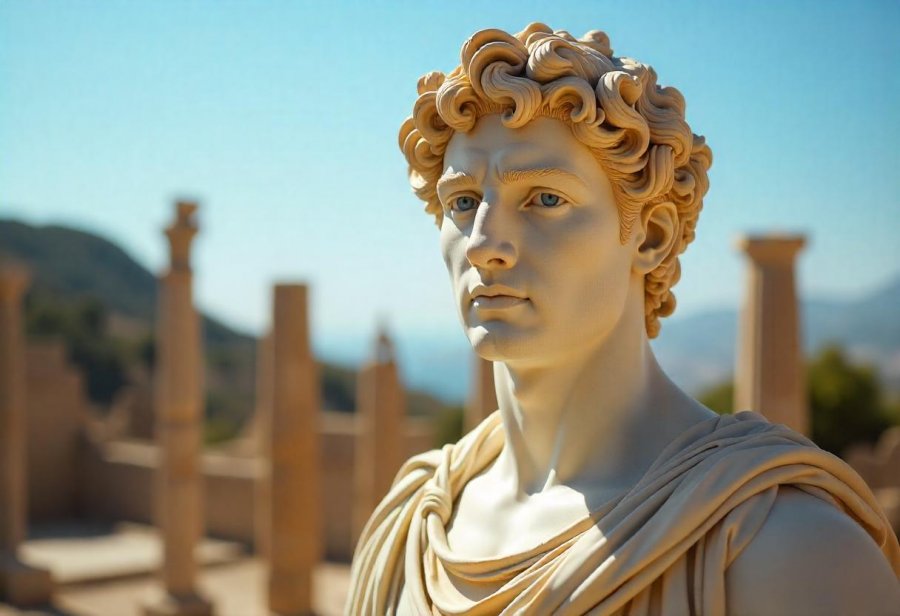Uncover the extraordinary journey of Alexander the Great, whose relentless ambition and strategic genius transformed him from a Macedonian prince into a legendary conqueror shaping the ancient world. From his early education under Aristotle to his swift political consolidation after his father’s death, Alexander’s leadership was marked by daring tactics, inspiring loyalty, and innovation on the battlefield. His campaigns not only expanded territory but fostered a vibrant exchange of cultures, leading to the spread of Hellenistic influence, majestic cities like Alexandria, and new pathways for trade and knowledge—forever altering history’s trajectory. Yet, what lessons can modern leaders draw from his blend of bold vision, cultural diplomacy, and resilience? His legacy challenges us to balance strategic agility with cultural sensitivity, demonstrating that true influence extends beyond conquest to inspire collective progress. Discover how Alexander’s visionary leadership continues to resonate, prompting us to reflect on the enduring power of innovation, adaptability, and shared purpose.

Unveiling the Foundations: Alexander the Great’s Formative Years and Early Ambitions
Alexander the Great’s early life was shaped by a confluence of exceptional circumstances that set the stage for his extraordinary leadership. Born in 356 BCE in Pella, the vibrant capital of Macedon, he entered a world already primed for expansion, thanks largely to his father, King Philip II. Philip’s military reforms and strategic ambitions transformed Macedonia from a relatively peripheral kingdom into a regional powerhouse capable of challenging Greece’s dominant city-states and beyond. From an early age, Alexander was immersed in the responsibilities of rulership—participating in court politics, observing military discipline firsthand, and engaging in diplomatic negotiations. This environment of privilege and expectation created a fertile ground for his burgeoning ambitions, fostering a sense of destiny that would become a defining feature of his character.
A crucial element of Alexander’s formative years was his education under Aristotle, one of the most influential philosophers of his time. This tutelage went far beyond rote memorization; it cultivated a broad worldview that integrated ethics, politics, and natural sciences. Aristotle’s influence helped shape Alexander’s curiosity and strategic mindset, providing him with a nuanced understanding of the wider world that extended beyond Macedon’s borders. Education for Alexander was not merely about acquiring knowledge but about developing leadership qualities—wisdom, discipline, and the ability to inspire loyalty. These lessons proved vital in his later military campaigns and governance, equipping him with a combination of intellectual rigor and practical ingenuity.
His upbringing was also deeply intertwined with his royal heritage, which cultivated a potent blend of cultural pride and relentless ambition. As the son of Philip II, Alexander was exposed early to the realities of power—court intrigue, military discipline, and diplomatic diplomacy. His family environment reinforced the Macedonian tradition of valor and conquest, instilling a fierce drive to emulate and surpass his father’s achievements. Yet, Alexander’s ambitions extended beyond simple imitation; he harbored a conviction that he was destined for greatness. From youth, he engaged in military exercises, led small campaigns, and dared to dream of uniting the known world under his banner. These early acts of daring and leadership foreshadowed the bold campaigns that would define his later years.
From the outset, Alexander demonstrated a relentless drive to surpass expectations, driven by a desire not merely for personal glory but for a lasting legacy that would reshape history. His early words and actions reveal a prince who believed he was destined for more than traditional rulership, envisioning an empire that stretched from Greece all the way to India. His innate curiosity, strategic intelligence, and fearless resolve fueled this vision, which he articulated through daring exploits even as a young man. Whether crossing treacherous terrains or engaging in small-scale battles, he consistently showed a remarkable capacity for leadership rooted in both intellectual ambition and physical bravery. His early life, therefore, was not merely a prelude but a crucible where the essential traits of a legendary figure were forged—an intricate blend of privilege, education, and innate drive.
Understanding Alexander’s formative years is essential to appreciating the leader he would become. His early experiences—privileged yet driven by an overarching sense of purpose—created a foundation where tactical innovation and cultural aspiration intertwined. The combination of Aristotle’s teachings and his royal upbringing shaped a leader capable of both strategic brilliance and inspiring loyalty. These qualities would serve him well as he transitioned from a prince with lofty dreams into a conqueror who reshaped the ancient world. His youth was not simply a prelude to his conquests but a crucible where the traits of resilience, curiosity, and strategic insight were meticulously forged. This complex interplay of nurture and innate ambition offers a compelling glimpse into how a young prince from Macedon achieved the impossible, transforming himself into one of history’s most legendary figures.
From Prince to Conqueror: The Strategic Rise of Alexander the Great
From his earliest days as a Macedonian prince, Alexander’s rise was marked by a rare combination of innate talent and strategic acumen that would propel him from a young heir to one of history’s most formidable conquerors. His accession to power followed the assassination of his father, King Philip II, in 336 BCE, an event that thrust Alexander into a position of immediate authority amid a volatile political landscape. The challenge was not only to consolidate his own rule but to do so swiftly enough to prevent rivals from exploiting the chaos. With remarkable decisiveness, he moved to quell rebellions and secure loyalty among the Macedonian aristocracy, demonstrating a natural aptitude for political consolidation early on. This swift consolidation of power laid the groundwork for his ambitious military campaigns, showcasing a leader capable of transforming a fragile kingdom into a launching pad for empire building.
What distinguished Alexander from other leaders of his era was his ability to translate personal ambition into disciplined, cohesive military action. He possessed an acute tactical mind, quickly earning a reputation as a master strategist who could think several moves ahead on the battlefield. His early campaigns reflected a keen understanding of the importance of morale and loyalty—traits he cultivated by sharing dangers with his soldiers and leading by example. This personal connection fostered a bond of trust that would underpin his most daring exploits. His reputation for bravery and his willingness to take risks inspired his troops, who followed him with unwavering loyalty even into the most perilous situations. These qualities made him not just a commander but a charismatic leader capable of motivating soldiers to achieve feats that seemed impossible.
Alexander’s military genius was vividly demonstrated in his innovative tactics and relentless pursuit of victory. At the Battle of Gaugamela in 331 BCE, facing a vastly larger Persian army, he employed deception, terrain advantage, and a series of bold maneuvers to turn the tide of battle in his favor. His use of the oblique phalanx, coupled with rapid cavalry flanking, exemplified a willingness to challenge conventional warfare and adapt strategies to the demands of each unique engagement. Beyond tactics, his logistical mastery and ability to maintain supply lines across vast and diverse terrains underscored his understanding that conquest depended just as much on planning and resource management as on combat prowess. His campaigns across Persia, from Babylon to Persepolis, reflected a relentless drive to push boundaries, often improvising on the battlefield to outmaneuver opponents larger or better prepared than his own forces.
Leadership for Alexander was rooted in a blend of tactical brilliance and personal charisma that created a sense of shared purpose among his followers. He understood that inspiring loyalty required more than fear; it demanded a vision that his troops could believe in. By leading from the front, sharing dangers, and demonstrating unwavering resolve, he fostered a unity that fueled his campaigns’ momentum. His ability to adapt to unfamiliar environments—mountain passes, deserts, jungle terrains—was complemented by his talent for psychological warfare, often unsettling enemies with surprise attacks or deceptive retreats. These tactics, combined with his personal example of resilience and daring, transformed his army into a cohesive, motivated force capable of executing complex maneuvers and enduring hardships that would have broken lesser leaders.
Alexander’s rise was not a matter of luck but a carefully cultivated blend of strategic foresight, daring innovation, and the capacity to inspire others. Every victory, whether against the Persian Empire or in uncharted territories like India, was driven by a relentless desire to surpass expectations and forge a legacy that would endure through the ages. His early campaigns reflected a leader willing to take risks and employ unconventional tactics, motivated by a vision of uniting the known world under his banner. This progression from prince to conqueror was marked by a series of calculated moves—crossing treacherous terrains, engaging formidable enemies, and adapting to unfamiliar cultures—that demonstrated an extraordinary capacity for leadership. Alexander’s ascent was, in essence, a testament to the power of strategic innovation, personal bravery, and an unwavering pursuit of greatness that transformed him into one of history’s most legendary figures.

Shaping the World: The Lasting Impact of Alexander’s Legacy
The long-term influence of Alexander the Great’s conquests extends far beyond the territorial boundaries he rapidly expanded. His campaigns forged a conduit for cultural, political, and intellectual exchanges that would reshape the ancient world in profound ways, many of which continue to echo in the modern era. Central to this legacy is the phenomenon of Hellenization—where Greek language, art, and customs spread into Persia, Egypt, India, and Central Asia—creating a vibrant tapestry of shared traditions. This cultural blending was more than superficial diffusion; it represented a deep integration of diverse practices that laid the groundwork for a new interconnected cultural landscape. This synthesis fostered a cross-fertilization of ideas, philosophies, and technologies that persisted long after his death, influencing subsequent civilizations and shaping the very fabric of identity across these regions.
Cities such as Alexandria in Egypt stand as enduring symbols of this legacy. These urban centers became melting pots of Greek and local traditions, serving as hubs of learning, commerce, and innovation. The legendary library of Alexandria exemplifies the era’s intellectual dynamism—a place where scholars from various backgrounds gathered to exchange knowledge in fields ranging from science to philosophy. Such institutions not only preserved Greek scientific and literary achievements but also facilitated their integration into local contexts, sparking advancements that would ripple through centuries. The influence of these centers extended into the Roman period and beyond, helping to shape Western intellectual traditions and scientific inquiry that continue to influence contemporary thought.
Alexander’s approach to empire-building also challenged and redefined ideas of governance and sovereignty. His strategy of incorporating local elites into his administration and promoting a degree of cultural and political fluidity demonstrated a pragmatic understanding of empire as a dynamic, adaptable entity. This model of governance—balancing imperial authority with local participation—offered a template for later rulers seeking stability across diverse populations. It emphasized mutual benefit and shared purpose, fostering a sense of unity that could withstand the inevitable fractures of empire. This legacy of flexible, inclusive governance echoes through the Hellenistic kingdoms and even into Roman administrative practices, illustrating how Alexander’s methods for cultural and political integration remained influential long after his empire fragmented.
Militarily, Alexander’s campaigns introduced innovations that would influence warfare for generations. His mastery of rapid mobility, combined arms tactics, and psychological warfare redefined battlefield strategy. Techniques such as deception, surprise flanking, and the use of terrain to his advantage became standard components of military planning, studied and adapted by armies from Rome to the Mongols. His emphasis on strategic flexibility and innovation demonstrated that victory depended not solely on brute force but on the ability to think creatively and adapt swiftly to changing circumstances. These lessons in military thinking—emphasizing ingenuity, psychological manipulation, and logistical discipline—remain relevant, underpinning modern strategic thought and operational planning.
Beyond the battlefield, Alexander’s conquests established a vast network of trade routes and cultural exchanges that laid the foundation for the later Silk Road. This web of interconnected routes facilitated the spread not just of goods, but also of technologies, religious beliefs, and scientific knowledge across vast distances. It connected the Mediterranean with the Far East, fostering intercultural dialogue and mutual influence that would flourish over subsequent centuries. This early form of globalization, initiated through Alexander’s military campaigns, helped forge links that transcended geographical and cultural boundaries, contributing to the shared development of civilizations across Eurasia. The legacy is a testament to how conquest, when coupled with cultural openness, can catalyze a broader process of interconnected growth.
Perhaps most enduring is the example of personal leadership that Alexander set—an influence rooted in charisma, vision, and resilience. His ability to inspire loyalty through personal example, shared risks, and a compelling mission created a sense of unity that transcended individual differences. Leaders in various fields today recognize that authentic influence—built on trust, integrity, and a clear purpose—can have a lasting impact. Alexander’s life demonstrates that influence forged through shared sacrifice and genuine commitment can elevate communities and foster collective achievement. His legacy encourages modern leaders to pursue their ambitions not merely for personal gain but to inspire others toward common goals that transcend individual interests.
In sum, Alexander’s conquests did more than reshape maps; they transformed the cultural, political, and technological fabric of the ancient world. His legacy is a testament to the power of visionary leadership and strategic innovation—elements that continue to inform our understanding of empire, diplomacy, and cultural exchange. His life exemplifies how daring ambition, combined with pragmatic governance and cultural sensitivity, can forge a lasting impact that endures through the ages. It is through this lens that we recognize Alexander not simply as a conqueror, but as a pioneer whose influence laid the groundwork for a connected, dynamic world—one that continues to evolve in his wake.
His innovative strategies and commitment to cultural integration have inspired countless leaders and thinkers throughout history. For those interested in exploring the enduring impact of his legacy further, examining the influence of the Hellenistic world can offer valuable insights. To learn more about how Alexander’s conquests shaped the ancient and modern worlds, visit History of Alexander the Great.
Lessons for Today: Alexander’s Strategies and Vision in Modern Leadership
The strategic brilliance and relentless ambition exemplified by Alexander the Great continue to resonate well beyond the ancient battlefield, offering enduring lessons for contemporary leadership and strategic thinking. His capacity to adapt tactics to diverse environments, employ innovative military strategies, and inspire unwavering loyalty among his followers remains a compelling blueprint for success. Today’s leaders—whether in military, political, or corporate spheres—recognize that cultural intelligence, resilience, and agility are essential qualities, all of which Alexander demonstrated repeatedly. His talent for integrating diverse cultural elements into his campaigns not only facilitated conquest but also fostered long-term influence, illustrating that diplomacy and collaboration can be as powerful as force.
In the realm of strategy, Alexander’s emphasis on meticulous planning and bold decision-making continues to inform modern practices. His campaigns reveal the importance of detailed reconnaissance, understanding terrain, and gathering intelligence before engaging an opponent—principles that underpin contemporary military doctrines and competitive strategies alike. The deception tactics he employed, such as feigned retreats and surprise flanking, highlight the value of flexibility and unpredictability. These lessons extend beyond the battlefield; whether negotiating complex political landscapes or navigating corporate negotiations, the ability to pivot swiftly and employ creative solutions remains vital. Alexander’s strategic agility underscores that success often depends on thinking beyond conventional methods and embracing innovative approaches.
Leadership rooted in personal influence and motivation also finds echoes in today’s organizational and political environments. Alexander’s capacity to inspire loyalty through personal example, shared risks, and a compelling vision remains a model for effective influence. His willingness to lead from the front—sharing dangers and hardships—fostered a sense of unity and purpose that translated into extraordinary commitment. Modern leaders increasingly understand that authentic leadership, grounded in integrity and clarity of purpose, can motivate diverse teams to achieve remarkable results. Alexander’s example reminds us that influence built on trust and shared values can elevate collective effort and resilience even amid adversity.
Cultural diplomacy stands out as one of Alexander’s most enduring legacies. His campaigns were not merely about territorial expansion but about creating bridges between peoples and traditions. By integrating local elites into his administration and encouraging the mingling of Greek and Eastern customs, he demonstrated that influence and stability are rooted in mutual respect and shared identity. This nuanced approach to governance fostered a sense of unity that endured beyond his lifetime, providing a template for sustainable empire-building. Today’s globalized environment demands similar skills—empathy, adaptability, and the ability to build bridges across differences—qualities that Alexander exemplified through his policies and personal diplomacy.
Alexander’s mastery of rapid mobility, combined arms tactics, and psychological warfare redefined battlefield strategy and influenced warfare for generations. His emphasis on deception, surprise, and terrain manipulation demonstrated that victory depended as much on creative thinking as on raw force. Modern military and strategic thinking continue to draw from these principles, emphasizing adaptability, innovation, and the importance of understanding the human element in conflict. Leaders today who emulate his flexibility and inventive mindset are better equipped to navigate the unpredictable terrain of complex challenges, turning obstacles into opportunities for breakthrough success. His legacy in this sphere underscores that strategic agility and psychological insight are timeless assets.
The network of trade routes and cultural exchanges established during Alexander’s campaigns laid the groundwork for the later Silk Road, fostering interconnectedness across vast regions. These routes facilitated not only the exchange of goods but also of technologies, religious beliefs, and scientific knowledge. By creating pathways for intercultural dialogue, Alexander unwittingly catalyzed a process of globalization long before the modern era. His empire’s influence extended far beyond military conquest, shaping economic and cultural development across Eurasia. This interconnected web exemplifies how conquest, when paired with openness to cross-cultural engagement, can produce enduring networks of influence and shared growth.
Perhaps most enduring is the example of personal leadership that Alexander set—an influence rooted in charisma, vision, and resilience. His ability to inspire loyalty through personal example, shared risks, and a compelling mission created a sense of unity that transcended individual differences. Today’s leaders in government, business, and social movements recognize that authentic influence—built on trust, integrity, and a clear purpose—can have a lasting impact. Alexander’s life demonstrates that influence rooted in shared sacrifice and genuine commitment can elevate communities and foster collective achievement. His legacy encourages modern leaders to pursue their ambitions not solely for personal gain but to inspire others toward common goals that transcend individual interests.
His approach to cultural integration and diplomatic engagement offers profound insights still relevant today. By weaving local traditions into his empire’s fabric, Alexander showed that influence built on mutual respect and understanding can be more enduring than dominance alone. This nuanced strategy of fostering shared identities and cross-cultural dialogue laid a foundation for stability and influence that persisted long after his death. In today’s interconnected world, leaders who prioritize building relationships, fostering dialogue, and embracing diversity can achieve sustainable impact—principles that Alexander demonstrated through his policies and personal diplomacy. Embracing these values enhances influence and fosters resilience amid complexity.
Ultimately, the story of Alexander’s leadership challenges us to think beyond immediate results and consider the broader implications of vision, resilience, and cultural sensitivity. His life exemplifies that transformative influence arises not merely from daring action but from a sustained commitment to purpose and adaptability. Whether in politics, business, or social spheres, these qualities remain vital. Studying Alexander’s example inspires us to lead with integrity, innovate boldly, and foster understanding across differences. His legacy reminds us that true greatness lies in inspiring collective effort, nurturing trust, and continuously adapting to new realities, shaping a future that echoes the enduring power of visionary leadership.

Reflections on Greatness: Key Insights from Alexander’s Life and Leadership
Alexander the Great’s relentless drive and visionary leadership leave an indelible mark that continues to inspire and instruct across centuries. His ability to perceive opportunities beyond immediate horizons, combined with strategic agility, exemplifies how bold, informed action rooted in a clear sense of purpose can shape history. His life demonstrates that leadership is more than conquest; it’s about inspiring a shared vision that elevates others and fosters collective achievement. Reflecting on his example, we see that true influence arises from a blend of daring ambition and meticulous planning, where each move is guided by a long-term goal of societal transformation rather than fleeting gains.
What stands out most vividly from Alexander’s story is the vital role of resilience amidst adversity. His campaigns, often undertaken under logistical hardships, unpredictable terrains, and fierce opposition, reveal a leader who refused to be daunted by obstacles. Instead, setbacks became opportunities to refine tactics and deepen resolve. This resilience, paired with innovation and a willingness to take calculated risks, offers a crucial lesson: success hinges on maintaining focus and adapting swiftly in the face of uncertainty. His example encourages us to view challenges not as insurmountable barriers but as catalysts for growth and ingenuity.
Equally compelling is his mastery of cultural diplomacy, which underscores that conquest need not only be about domination but about creating bridges between peoples and traditions. Alexander’s efforts to integrate local elites, foster intercultural exchanges, and respect diverse customs helped establish bonds that endured long after his empire fragmented. This nuanced approach to governance and influence demonstrates that sustainable leadership depends on building trust and understanding across differences. In today’s interconnected world, leaders who prioritize genuine cross-cultural engagement and mutual respect can foster stability and shared progress, much like Alexander did in his vast and diverse empire.
His innovations in warfare—rapid mobility, combined arms tactics, psychological manipulation—redefined battlefield strategy and left a lasting legacy in military science. His emphasis on deception, terrain mastery, and swift adaptation showed that victory often depends on creative thinking and flexibility. Modern military and strategic planning continue to draw from these principles, emphasizing ingenuity, psychological insight, and operational discipline. Leaders who emulate his capacity to think beyond conventional methods and leverage the human element are better equipped to navigate the complexities of today’s challenges and turn obstacles into opportunities for breakthrough success.
The network of trade routes and cultural exchanges established during Alexander’s campaigns laid the groundwork for the later Silk Road, fostering interconnectedness across vast regions. These pathways facilitated not only the exchange of goods but also of technologies, religious ideas, and scientific knowledge. By creating conduits for intercultural dialogue, Alexander catalyzed a process of globalization long before the modern era. His empire’s influence extended beyond military conquest, shaping economic and cultural development across Eurasia. This interconnected web exemplifies how conquest paired with openness to cross-cultural exchange can produce enduring networks of influence and shared growth.
Perhaps most enduring is the example of personal leadership that Alexander set—an influence rooted in charisma, vision, and resilience. His capacity to inspire loyalty through personal sacrifice, shared risks, and a compelling mission created a unifying force that transcended individual differences. Modern leaders recognize that authentic influence—built on trust, integrity, and a clear purpose—can have a lasting impact. Alexander’s life shows that influence rooted in genuine commitment and shared ideals can elevate communities and foster collective achievement, inspiring others to pursue higher goals with conviction and resilience.
His approach to cultural integration and diplomatic engagement offers insights that remain deeply relevant today. By weaving local traditions into his empire’s fabric, Alexander demonstrated that influence founded on mutual respect and understanding can be more enduring than dominance alone. This nuanced strategy of fostering shared identities and cross-cultural dialogue laid a foundation for stability and influence that persisted long after his death. In an increasingly globalized environment, leaders who prioritize empathy, dialogue, and diversity can forge lasting bonds and achieve sustainable impact—principles exemplified by his policies and diplomacy.
The story of Alexander’s leadership challenges us to think beyond immediate results and focus on the broader implications of vision, resilience, and cultural sensitivity. His life exemplifies that transformative influence arises from daring action, strategic foresight, and a commitment to a higher purpose. Whether in politics, business, or social endeavors, these qualities remain essential. By studying his example, we are reminded that true greatness involves inspiring collective effort, fostering trust, and continuously adapting to new realities. His legacy encourages us to pursue our ambitions with courage, integrity, and an openness to learning from the diverse human tapestry we seek to shape.







